牛津版7A Unit4 main sentences
Unit4知识点 牛津译林版英语七年级上册

7AU4知识点New words and expressions:1.wake up.He wakes up at six o’clock.1.He wakes her up at seven o’clock.2/Shall we go fishing this afternoon?OK/Good idea! That’s all right. (No,let’s go shopping.3.He seldom goes out.He’s never late for school.4.She has breakfast/lunch/dinner.5.I need to go home early6.have a good rest7.have fun/have a good (great) time (in) doing sth.I have fun playing football8.have lessons/have an English lesson.9.after-school activities10.do one’s homeworkHe does his homework/We do our homework.He doesn’t do his homework./Does he do his homework?11.go to bed. He goes to bed at 9/He gets up at six .12.be late for He is late for school/the meeting.13.The meeting/Our school starts at 8 o’clock.14.a quarter past six/seven half past eight15.at six in th emorning/afternoon16.play football first.17.chat with him/her chat with each other18.learn from each other/ help each other19wish best wishes wish you successWish your team good luck.20.would like to go shopping.Would you like to go shopping this afternoo ?21.save my life---save their lives.22.go to the museum.23twice a week/once a year. How often does he go home?24.go on a picnic=go on picnics25.dislike playing games27.get ready for th eparty/th emeeting.28.learn a lot about the worldLanguage points: 1.It’s time for breakfast=It’s time to have breakfast2.Shall we go running/walking in the hill?3.I seldom go out /play games.4.After sleep I sleep.5.nad a good rest/He needs some milk.6.I don’t know how to have fun/what to do /how to do it/where to go7.What time do you strat lessons?8enjoy myself/enjoy working in Beijing/living in Shanghai.9.talk about playing games.10.from Monday to Friday—five days a week.11.Our lessons begin at 8:15.12.My favourite subject is English/sport is swimming.13.a lot of friends—lots of /many14.They are all nice(kind) to us---All of them are nice to us.15.a Reading Club16.read books/borrow books from the library.17.I also like playing volleyball.18.I’m in the school volleyball team=I’m a member of the school team.19.on Wednesday afternoon20.in the evening/in March/in winter/in 2202/in 2012.321.on Saturday/on 1 July/on Sunday morning/on Children’s Dayon a cold morningo/ on the afternoon of September 122.at seven o’clock/at 6 years old/at Christmas23.Thanks for your e-mail/giving me a pen/helping us with our English.24.tell you about my life/tell us about your school.25.I’m good at playing football=I play footballwell.26.He often plays football in the playground.27.She doesn’t have lunch time to play tennisShe has atime to sing.28.She’s a member of th eswimming team.She usually swims after school.29.He never plays basketball.30.He goes to her dancing lessons.31.She always dances for half an hour.32.She sometimes goes roller skating.33.Saturday ,7 November.34.Welcome to our schol/our school football match.35.There’s a volleyball match between A and B.36.He goes there by bus.37.I hope everyone can come and watch the game.38Wish our team good luck.39.What do you like to do at weekends?40.How often do you visit the Great Wall.Twice a month41.Morning exercises are good fo rus.42.Reading in th esun is bad for your eyes.43.have too much homework to do.44.so I can’t play basketball well.45.It helps me get ready for the day.48.I don’t like singing.49.It’s fun/interesting.。
2016牛津英语新教材7A-Unit4 My day!-Reading

What about your school life?
Complete the sentences about your day and talk about it. P46 C
当堂测试
一、从方框中选择合适的词或词组,并用适当的形式填空。 chat with, practise, each other , in the playground , wish, be nice to, have a good time, after school
always ________ Millie ______ is ________ kind ______ to others.
4. 该做家庭作业了。 It’s time ________ for ____________. homework
It’s time _______ homework to ______ do _____________. 5. 你该做家庭作业了。
根据句意及汉语提示完成单词。(3 points) chats 聊天)with my 1. My mother often________( aunt. first 2. Please wash your hands_______( 首先). Then have lunch. practises 练习) speaking English 3. He ___________( every morning.
8.15 a.m.
have lessons
[fɜːst]
They do morning exercises first, then they start their lessons.
首先
play volleyball
read books
牛津初中英语7A Unit4 Grammar

rule:on + date
How to use “on”
on: we use ‘on’ before:
days _____, dates parts of a specific day(具体一天的早中晚) special holidays (特别的假期)
Practise
1.A:When is New Year’s Day? on January 1st B: It is ____________. 2.A:When does new term start? September 1st B: It starts on ____________. 3.A:When is Teachers’ Day?
Tomorrow ,yesterday ,the day after tomorrow ,the day before Yesterday 前不用任何介词
Dear Millie,
Practise 2:.Read Part A on P45 and finish Part A1
Thanks for your email. I would like to tell you about my life here.
Practise 1:选用介词at,in,on填空
四.辅导反思、拓展延伸
D ( )His uncle takes his dog
a walk
every lunchtime. (同步导学 P19 选择题5) A.for, at B.of, at C.of,/ D.for, /
Attention: next ,last ,this ,one ,any,each , every ,some ,all 的词组和
Unit 4 My day!
七年级英语牛津版7A Unit 4 integrated skills课件

A. often. B. for two/three… hours.
How long do you watch TV?
A. often B. for two/three… an hour.
How often do you watch TV?
for two hours for two days for two weeks for two months for two years for more than an hour
*How often does she eat cakes, biscuits and candies? A. often B. seldom C. never
*How often does she eat fruit and vegetables? A. never B. seldom C. often
*How much TV do you watch every day?
*How often do you walk to school?
A report on my partner(搭档)
My partner exercises ______. He/She sleeps for ________ hours every night, and watches hours of TV every day. He/She _______eats cakes, biscuits and candies and _______ eats fruit and vegetables. He/She ______walks to school. Overall, he/She is __________.
Unit 4
How to keep fit
牛津7A Unit4 Grammar B+C

1
2
bread ( U )
banana ( C )
3 tea ( U )
4 carrot ( C )
We can also use nouns in front of uncountable nouns to show their amounts.
a…of + uncountable noun
a glass of milk a kilo of meat
Millie: Yes.
Countable nouns
potatoes carrots mangoes vegetables apples
Uncountable nouns
chicken rice fruit salt Coke milk
Grammar: C
Using “there is/ there are” a singular noun
(2)There is a picture on the wall. 墙上有一张画。
(3)There are seven days in a week. 一周有七天。
(4) There is a box of apples on the table. 在there be 结构中一定要注意谓语就近的 原则。
(5) There is a pen and two books on the desk.
(6) There are two books and a pen on the desk.
There be的句型转换: 一般疑问句及其回答:
Is (Are) there...? Yes, there is. No, there isn't.
a mango → mangoes
牛津译林版七年级英语上册unit4全单元教案
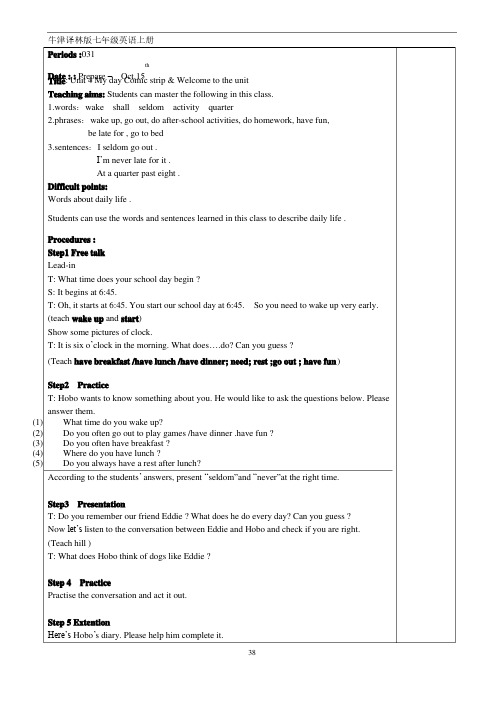
38 牛津译林版七年级英语上册牛津译林版七年级英语上册Periods :031Date : : Prepare – Oct.15th Title : Unit 4 My day Comic strip & Welcome to the unitTeaching aims: Students can master the following in this class.1.words :wake shall seldom activity quarter2.phrases :wake up, go out, do after-school activities, do homework, have fun,be late for , go to bed 3.sentences :I seldom go out .I’m never late for it .At a quarter past eight . Difficult points:Words about daily life .Students can use the words and sentences learned in this class to describe daily life .Procedures :Step1 Free talkLead-inT: What time does your school day begin ?S: It begins at 6:45.T: Oh, it starts at 6:45. You start our school day at 6:45. So you need to wake up very early. (teach wake up and start )Show some pictures of clock.T: It is six o ’clock in the morning. What does ….do? Can you guess ?(Teach have breakfast /have lunch /have dinner; need; rest ;go out ; have fun )Step2 PracticeT: Hobo wants to know something about you. He would like to ask the questions below. Please answer them.(1) What time do you wake up?(2) Do you often go out to play games /have dinner .have fun ?(3) Do you often have breakfast ?(4) Where do you have lunch ?(5) Do you always have a rest after lunch?According to the students ’ answers, present “seldom ”and “never ”at the right time.Step3 PresentationT: Do you remember our friend Eddie ? What does he do every day? Can you guess ?Now let’s listen to the conversation between Eddie and Hobo and check if you are right. (Teach hill )T: What does Hobo think of dogs like Eddie ?Step 4 PracticePractise the conversation and act it out.Step 5 ExtentionHere’s Hobo ’s diary. Please help him complete it.It is sunny today. I would like to go________. I like sports and I always go walking in the ____________. But my friend Eddie is lazy. He ___________does sports. He _________up very late.And then he wants to have __________. After it, he sleeps again. When he finishes his lunch, he says he ________a good _______ once more.Oh, my God ! His life is eating and sleeping. I think some dogs ________don’t know how to have____________.Step 6 PresentationT: Do you want to be lazy like Eddie? What time do you wake up every morning ? What time do you have breakfast / lunch / dinner /every day ? Why do you get up so early ?(Teach quarter, past, get up and be late for, have lessons/have classes. do after-school activities, do homework, go to bed …)Step 7 PractiseLook at the table of Millie’s day. Answer some questions.Look at the times on the blackboard. Please tell me your activities at these times.6:30 a.m 7:00 a.m 8:00 a.m 11:50 a.m4:30 p.m 6:00 p.m 8:00p.m 9:00 p.mMake sentences with “I _________________ at_____________.”Step 8 PresentationPart BT: Millie is busy every day. Now, she is telling her aunt about her school life. Let’s listen to their conversation and answer my question: Is Millie often late for school ?S: No. She is never late for school.T: Millie is a good student. She is never late for school. What about you? Are you often late for school? Are you never late for school?Step 9 PractiseRead Part B and practice it .T: Are your daily activities the same as Millie’s ? Now, you can complete the table on the right with your own information.…….T: Now time for you. I’d like you to work in groups of four to discuss your own day. You can use Millie and her aunt’s conversation as a model.Homework :1. Learn the new words by heart.2.Finish the exercisesAfterthoughts :Periods :032-033Date : : Prepare – Oct.15thTitle: Unit 4 My day ReadingTeaching aims:1. Students can master new words and expressions.2. Students can learn some new phrases: chat with best wishes have a good time3. Students can learn some new sentences:Our school starts at eight in the morning from Monday to Friday.Usually we do morning exercises first.Procedures :Step1 Free talk1.Do you have a full(充实的)充实的) and busy day?2.What do you usually do every day?Step2 PresentationListen to the passage and choose a title for this e-mail.Step3 ScaningRead the passage quickly and silently and do “T” or “F” questions in pairs.(partB2)Setp4 SkimmingRead the article again and do more exercises. (partB1)Step5 RetellingRetell Millie’s school life . Fill in the blanks.( partB3)Step6 Language pointsSome language points :a lot of = lots ofSometimes , some times , sometime , some timehave a good timeHomework :1. Learn the new words by heart.2.Finish off the exercises.Afterthoughts :Periods :034-035Date : : Prepare – Oct.18thTitle: Unit 4 My day GrammarTeaching aims:1. Students can use the prepositions correctly.2. Students can use the adverbs of frequency correctly.Difficult points: the usage of the prepositionsProcedures :Step1 Presentation1. Free talk .Use some questions to lead the usage of the prepositions .eg: What time do you go to school?When is your birthday?2. P47表格,教师归纳总结,领读例句。
牛津英语7A Unit 4-Main task

Read and fill in the form
Name/ Age Millie, 12 years old
Hobbies Breakfast/ Reason Lunch/ Reason
Supper/ Reason
Playing volleyball
Have some bread, an egg, a glass of orange juice./ Help me start a day.
3. What can you get from 100g of beef ? 390 Calories, Vitamin B12 and Vitamin B6.
4. Is the peanuts a kind of healthy food? Why ? Yes, it is. Because we can get calories, Vitamin B and Vitamin E from the peanuts.
18. 每周三至六次
Homework
1. Revise the important words and
phrases in Unit 4. 2. Write a short passage about your
own “healthy eating”.
Revision Phrases of Unit 4
13. 在前面 in front of go roller skating a packet of… less than
14. 去溜旱冰
15. 一纸盒…… 16. 不到…… 17. 超过……
more than
three to six times a week
2. She always has some noodles and a glass of milk for breakfast. F 3. She loves fruit very much. T 4. One of her hobbies is playing volleyball. T 5. She often has some soup, meat and vegetables for dinner. T
牛津版7A Unit4 main words
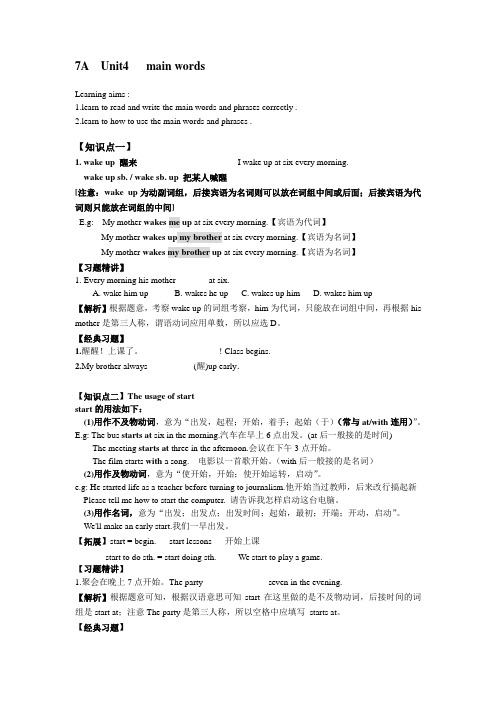
7A Unit4 main wordsLearning aims :1.learn to read and write the main words and phrases correctly .2.learn to how to use the main words and phrases .【知识点一】1. wake up 醒来I wake up at six every morning.wake up sb. / wake sb. up 把某人喊醒[注意:wake up为动副词组,后接宾语为名词则可以放在词组中间或后面;后接宾语为代词则只能放在词组的中间]E.g: My mother wakes me up at six every morning.【宾语为代词】My mother wakes up my brother at six every morning.【宾语为名词】My mother wakes my brother up at six every morning.【宾语为名词】【习题精讲】1. Every morning his mother_______ at six.A. wake him upB. wakes he upC. wakes up himD. wakes him up【解析】根据题意,考察wake up的词组考察,him为代词,只能放在词组中间,再根据his mother是第三人称,谓语动词应用单数,所以应选D。
【经典习题】1.醒醒!上课了。
_______ _______! Class begins.2.My brother always __________(醒)up early.【知识点二】The usage of startstart的用法如下:(1)用作不及物动词,意为“出发,起程;开始,着手;起始(于)(常与at/with连用)”。
E.g: The bus starts at six in the morning.汽车在早上6点出发。
新牛津译林版七年级英语下册Unit4 Four Main Task精品课件.ppt
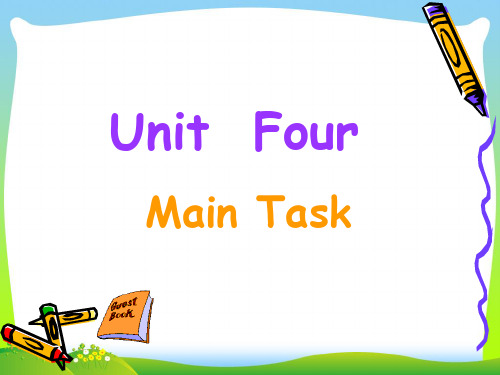
What we eat in our daily life: lunch/dinner:
Rice, noodle, fruit, soup, meat, vegetables…
healthy food unhealthy food
Millie’s article:
Name Age
Millie 12
2. I need vitamins to stay healthy.
B级:
词 汇 1. amount 2. can 3. calory 4. Vitamin 词 组 1. green tea 2. start the day 句 子 1. This meal gives me energy for playing
4、厨房里有两篮土豆。
There are two _b_a_s_k_e_t_s_o_f__p_o_t_a_to__e_s__
in the kitchen.
5、他早餐吃几片面包。
He h_a__s_s_o_m__e_s_l_i_c_e_s_o_f__b_r_e_a_d__fo_r__b_r_e_a_k_f_a_s_t.
Are you ready? Let’s begin!
Homework: 1.Read P72 for three times. 2.Workbook P79-P80. 3. Preview P73. 4. Check your article and write
it on your own notebook.
Hobbies playing football
Breakfas some bread and an egg
t
a glass of orange juice
牛津7A Unit4 Integrated skills

not...at all
一点也不
try vi.&vt. 努力,试图;尝试
congratulation n. 祝贺
partner n. 搭档,合作伙伴 overall adv. 总体上说
You are not fit at all.
同义句: You are not healthy at all. not … at all
how long 多久(对一段时间提问)
1.Kitty dances for two hours every day.
How long does Kitty dance every day? 2.Daniel exercises for about 30 minutes every day. How long does Daniel exercise every day?
牛津版 七年级(7A) Unit 4
Unit4 Integrated skills
广东 钟 聪
怎样 how how old 几岁 how many 多少 how much 多少、多少钱 how far 多远 how tall 多高 how often 隔多久 how long 多久、多长时间
how often 隔多久(对表示频率的词
My Sister Mary
This is my sister Mary. ……
Work out your partner’s health score. Then write a report on him/her. Use the answers that he/she gave you.
New words
fit adj. 健康的,结实的 questionnaire n. 问卷 less than biscuit n. 饼干 total adj. 总的,全部的 point n. 分数,点 少于
牛津译林版英语7A Unit4 Grammar课件(共32张PPT)

park _in__ the morning.
II. 从各题后所给的A、B、C和D四个 选项中选出最佳答案。
1. Blue is Mary ’s favorite color, so
she ________ wears blue clothes.
at: we use at before t_i_m_e__o_f_d_a_y_, _a_g_e_.
表示时间的介词: at, on, in
at表示时间的某一点。 e.g. at six o’clock 在六点 on表示某日或和某日连用的某一 时间段。 e.g. on Monday 在周一 in表示除日之外的某一时间段。 e.g. in 2014 在2014年
Mr Wu is writing about how often the students exercise. Look at the graph above. Then help him complete the sentences below.
1. Simon loves playing football. He _o_ft_e_n_ plays football in the playground.
We use different prepositions to talk about time.
in:we use in before:_p_a_r_ts__o_f _th__e_d_a_y_, _m__o_n_th_s_, _s_e_a_so_n_s_, _y_e_a_r_s.
on: we use on before:_d_a_y_s_, _d_a_te_s_ _sp_e_c_i_a_l _h_o_li_d_a_y_s_, __d_a_t_e_s _.
牛津译林版7A Unit4 Grammar (共31张PPT)
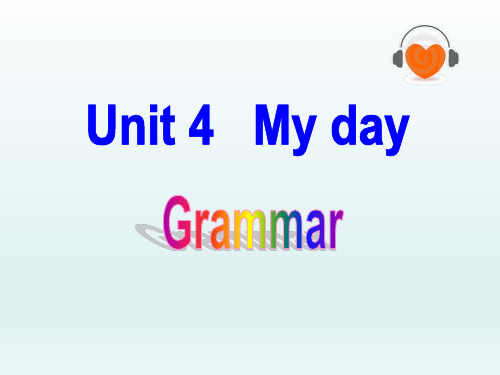
We do not have lessons _o_n__ Saturday or Sunday.
I love sports. I am good at playing football. I often play it with my friends _o_n__ Saturday afternoon. We have a school football match __in__ autumn every year. This year, it is __o_n_ 15 November. My friends and I always have great fun then.
Free Talk
What time do you get up every day?
I get up at 6 a.m. What day do we have the class
meeting?
On Monday.
When do you usually swim with your friend?
on 7 October on Monday
3 具_体_某__日__的__早__中_晚_ 前 on the morning of
4 有__d_a_y_的__节__日__前_
on
May 10 May Day
Prepositions of time 时间介词
1. parts of day 2. months 3. seasons 4. years
1. My parents watch TV in the evening. 2. We plant trees in March every year. 3. In Hainan, it never snows in winter. 4. The 22nd World Cup is in 2022.
牛津初中英语7A UNIT4 MAINTASK教案

牛津初中英语7A UNIT4 MAINTASK教案板书设计Unit 4 Food (Main Task)(Write down thefood studentsmentioned intocolumns.)New words:calory / /vitamin / /need energy (different)For breakfast, I have…to start the dayFor lunch, I have….for the afternoonFor dinner, I have….It’s important …to drink water.教学过程教师边导边教学生边学边练Tell the students that two days ago you met one of your friends, Don. Draw a sketch on the blackboard at the sametime. (Draw thepicture as funny aspossible. Draw itstep by step and getthe students toguess what it is.The students maylike this. This will make them be eager to know something more about the person.) Introduce the person and ask the students the following questions:Is he fat or thin?Is he healthy or not?Why is he so fat?What kind of food does he eat? Write the names of different kinds of food on the blackboard in columns. The students watch and guess what it is and speak out their answers.Answer the teacher’s questions. And discuss the questions with their partners (in groups of four). Report their answers one by one. (Discussion can help the students to get more ideas and be more creative.) They would probably talk about “Having an easy heart = stay happy”.Name different kinds of food (most of them are not so healthy).(The students can revise the vocabulary and at the same time learn from each other or simply consolidate what they have learnt. We are also using the old knowledge to reinforce the new-learned vocabulary.)Brainstorming。
牛津英语译林版7A Unit4 Grammar (共41张PPT)
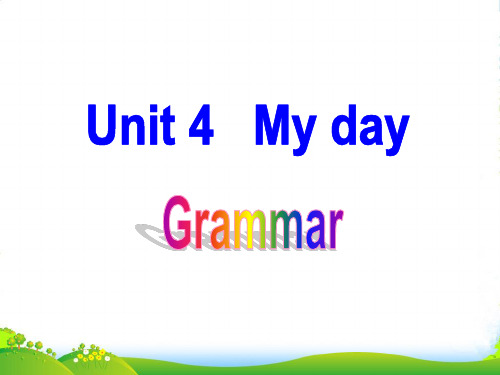
➢What’s the date today?
It’s November 19.
➢Can you say the names of a week ?
一星期的名称
➢What are they?
They are Monday
summer
autumn
winter
时间介词
我们谈论时间时, 何时用at / in /on ?
时间介词
at: 用在: 1. _钟__点__时_ 间前 2. _三__餐__时__间前
at 6:00am at supper
3 _具__体__年__龄__前_______ at 8 years old
on: 用在:
1. _某__月__某_ 日前
on 7 October
2. _一__星__期__名称前 on Monday
3
某_日__的__早__中__晚__前_____
on
the morning May 10
of
4 有_d_a_y_的_ 节日前
on May Day
在有day节日前用 on
1. New Year’s Day 元旦节
May Day . 4. He often takes Eddie for a walk __i_n__
the evening. 5. They have a long holiday ___in___
November.
6. He was born ___in___ 1992. 7. People are very happy __a_t___
All the best,
Tommy
七年级英语上册 Unit 4 Main task 课件1 牛津

Please write an article about your own diet and then read it to your group members using Millie’s article as a model.
Life Tips Have a healthy diet or lifestyle.
Name Millie
Hobbies playing volleyball
Breakfast
bread, an egg and a glass of orange juice
Lunch rice with fish and an apple
Supper soup, meat and vegetables
without prep. 没有 Without water, there can be no life on Earth. He often goes to school without eating breakfast. We can’t live without air or water.
Healthy Eating
Have a good sleep. Take more exercise.
Have a good day.
Homework
1.Look for more information about different kinds of food on the Internet or in the library. 2.Finish the exercises on the paper. 3.Write a composition about
I like eating fruit and vegetables.
- 1、下载文档前请自行甄别文档内容的完整性,平台不提供额外的编辑、内容补充、找答案等附加服务。
- 2、"仅部分预览"的文档,不可在线预览部分如存在完整性等问题,可反馈申请退款(可完整预览的文档不适用该条件!)。
- 3、如文档侵犯您的权益,请联系客服反馈,我们会尽快为您处理(人工客服工作时间:9:00-18:30)。
7A Unit4 main sentencesLearning aims :1.learn about the main sentences.2.Learn to write and use the main sentences.【知识点一】Is it time for breakfast?该是吃早饭的时间了吗?探究点:It is time for….意为“_______”。
It is time for…,意为“该是(做)……的时候了”,后接名词或动名词作宾语e.g: It is time for class/school/work. 该是上课/上学/上班的时候了。
It is time for playing football.该是踢足球的时候了。
[拓展] (1)“该是做……的时候了”还可用“It is time to do sth.”表示。
It's time to go to school.=It's time for going to school.该去上学了。
(2)“该是某人做……的时候了”用“It is time for sb.to do sth.”表示。
It's time for you to have dinner.你们该吃晚饭了。
for 的其他用法be late for / buy sth. for sb. = buy sb. sth. have…for breakfast wait for be ready for thank you for…【习题精讲】( )It is time _______supper. A.to B.for C.with D.at【解析】根据题意可知“是吃饭的时候了”,根据后接的supper可知是名词,用介词for 【经典习题】1.The boy is usually late school. A. on B.for C.with D. to2._______,Millie. It's time _______class.A. Wake up; forB. Wake up; toC. Take up; forD. Put up; for3.. It's 12:00 now. It's time_______ lunch.A. to haveB. hasC. forD. A& C【知识点二】Shall we go walking in the hills?咱们去小山里散步,好吗?探究点一:go walking意为“_______”。
go walking意为“去散步”。
We often go walking after lunch.我们经常在午饭后去散步。
[知识拓展] 与go walking相类似的短语有:go shopping去购物go fishing去钓鱼go swimming去游泳go skating去滑冰探究点二:shall we 意为“”shall we do sth 表提建议【拓展】表提建议的句型:shall we do sth…. = let’s do sth. = how/what about doing sth.? = why not/why don't sb do sth.?E.g: Shall we go shopping? = Let’s go shopping. = How about going shopping? = Why not go shopping?【习题精讲】1. Let’s __________(开始)our class with an English song.【解析】该题根据let可知,后应接动词原形,所以空格中应填写start。
【经典习题】1.-I am very hungry, Mum. May I have something to eat? -What about some_______?A. waterB. milkC. orange juiceD. bread2.晚饭后我们去散散步怎么样?。
3. 他们经常在晚饭后去公园散步。
They often_______ _______in the park after dinner.【知识点三】Millie, when do you go to school every day?米莉,你每天什么时候去上学?探究点:when与what time有何区别?when可以对动作发生的任何时间提问,what time只能对“几点钟”提问。
- When/What time do you get up in the morning? 你早上什么时候/几点起床?- At 6:30.六点半。
- When do you play football?你什么时候踢足球?- On Wednesday.在星期三。
【习题精讲】1.你通常几点钟吃早饭?_______ do you usually have breakfast?【解析】根据题意,该题主要问的是几点钟,对几点钟提问when和what time都可以,但是只有一个空就只能用when。
【经典习题】1. -_______do you usually get up in the morning? -I usually get up at 6:00 a.m.A. WhatB. WhenC. HowD. Where2.It is 8:00 a.m. now.(对画线部分提问)_______ _______ _______ it now?【知识点四】At a quarter past eight.在八点一刻。
探究点:英语中的“时刻”如何表示?英语中的“时刻”可用两种方法表示:直接表示法和间接表示法。
(1)直接表示法:直接用基数词表示。
如:7:20→seven twenty 8:50→eight fifty(2)间接表示法:用基数词和past或to表示。
当分钟数小于或等于30时用“分钟数+past+整点数”表示。
如:6:25→twenty-five past six 当分钟数大于30时化成几点差几分的形式,用“分钟数+to+整点数”表示。
如:7:50→八点差十分→ten to eight [注意] ①分钟数在前,整点数在后。
②在间接表示法中“一刻钟”常用a quarter表示;“三十分钟”常用half表示。
【经典习题】①5:15_______②9:50_______【知识点五】Usually we do morning exercises first.通常我们先做早操探究点:first在此用作_______词,意为“_______”。
first的用法如下:(1)用作限定词,意为“第一的;第一流的;(地位等)最高的;最早的;最先的;最前面的”。
The first day of a week is Sunday. 一周的第一天是星期天。
(2)用作名词,意为“第一;第一个;第一名;优等;开始;开始时间”。
He is always the first to be here. 他总是第一个到这儿。
(3)用作副词,意为“先,首先;第一;首次;最初”。
I do my homework first on Sunday. 在星期天我先做作业。
[辨析] first与at first的区别(1) first用来说明顺序,意为“先……”,暗示接下去还有其他动作或事件要发生,因此其后往往接有(或暗示有)then,next,last等。
Think first,then act.先想清楚再行动。
Do your homework first, and then watch TV. 先做作业,然后看电视。
(2) at first意为“起初;开始”,它主要用于强调前后对照,暗示接下去的动作与前面的动作不同甚至相反,因此常有but,afterwards,soon,at last等与之相呼应。
The work was hard at first, but I got used to it at last.起初这活儿很累,不过最后我习惯了。
【习题精讲】1.我先做作业,然后睡觉。
I_______ my homework_______ ,and then go to bed.【解析】根据汉语意思可知,先是用来修饰做的,用的是副词,所以空格中应填do ,first 【经典习题】1.What do you often do f_______ after supper?2.I go to WC(厕所)_______after class.A. at firstB. firstC. at the firstD. on first【知识点六】About once a week.大约一周一次。
探究点:once a week意为“_______”。
对once a week提问用_______。
once a week意为“一周一次”;对once a week提问用how often。
- How often do you go to see your grandparents? 你多长时间去看你的爷爷奶奶一次?- Once a week. 一周一次。
【辨析】how long、how soon 、how often 、how farhow long有以下两个主要意思:1. 表示多长时间,主要用来对一段时间(如three days, four weeks 等)提问。
如:--How long did he stay here? 他在这儿呆了多久?---About two weeks. 大约两个星期。
2. 表示某东西有多长。
如:--How long is the river? 这条河有多长?--About 500 km. 大约500千米。
how often的用法指每隔多久,主要用来对频度副词或状语(如:once a week, three times a month 等)提问。
如:--How often does he come here? 他(每隔)多久来一次?--Once a month. 每月一次。
how soon的用法指再过多久,主要用来对表示将来的一段时间(如:in an hour, in two weeks 等)提问。
如:--How soon will he be back? 他要多久才回来?--In an hour. 1 小时以后。
How far 距离(多远)一般对距离提问---How far is it from here to the zoo? ---It’s 6 kilometres【习题精讲】1 - _______do you watch TV? - Twice a week.A. HowB. How oftenC. WhenD. Where【解析】根据回答可知是频率进行提问,所以应选B2.you will come back from Beijing?A. How soonB. How oftenC. WhenD. Where【解析】根据回答可知是与将来时连用,所以应选A【经典习题】1. I go home to see my parents once a week.(对画线部分提问)_______ _______ _______you go home to see your parents'?2.-_______do you go shopping every week?- Once.A. How oftenB. How many timesC. How long D.How much【知识点七】I can learn a lot about the world.关于这个世界,我能了解很多。
